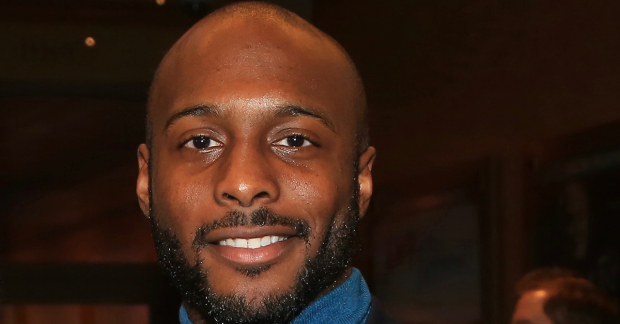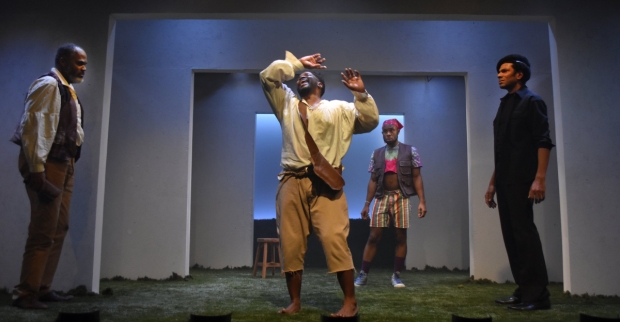Interview: An Artistic Journey to Healing With Playwright Mansa Ra
A deeply personal new play from dramatist Mansa Ra (Too Heavy for Your Pocket) is currently on stage at the Rattlestick Playwrights Theater. In the Southern Breeze is described as an "autobiographical fever dream" and tells the story of a man locked in an existential crisis and of his struggle to find a space for healing amid centuries of injustice. Here, Ra talks about the work, which runs in-person through December 12 and concurrently streams each night at 7:30pm for those who can't make it down to Waverly Place.
This conversation has been condensed and edited for clarity.

(© Tricia Baron)
Something I found really touching is that, on your website, you refer to yourself as an "artistic first responder." Can you talk a little bit about that and how it's impacted the work you're doing as an artist?
This has been an incredible opportunity to reset. The pandemic took my livelihood away, as it did for so many of us, and when you roll out who's essential in the way of nurses and bus drivers and food delivery people, it becomes super clear where you fit in our kind of social web. I spent my time really sitting back and waiting for the moment I become essential and thinking about what I would do differently and how I would bring my services when the time came.
Calling myself an artistic first responder just felt like the answer, because I'm a playwright, and unlike so many other content creators, it's harder to do that in a vacuum by yourself with a camera, you know? If you're seeing a play, it's because you love theater and it's because community is healing. You want a communal activity that's costing you something. And it's costing all of us. I caught the Delta variant developing my next show, so we are risking ourselves, still. I'm double-vaccinated, so it was basically a cold, but I'm out in these streets trying to give people healing at a cost to myself.
How has that idea of bringing healing to people through art aided in the development of In the Southern Breeze?
I started writing this play in 2015, but the issues have never not been present in the world. Every time a new person is killed in a community of color and it comes across my screen, I stop and pay attention. But your algorithm isn't my algorithm. And for one moment in history, everybody's algorithm was the same thing. Everyone was looking at Covid numbers and George Floyd. That was significant.
When it came time to produce In the Southern Breeze, there were a couple of things that needed to be in place for us to feel safe doing this kind of work emotionally, mentally, spiritually, and physically. It started with the team. We wanted to make sure that it was a healing process for the people who were auditioning. When we were doing the graphic design, we discussed, like, "How does this piece make you feel? How are you processing it?" Not just, "Here's your deadline."

(© David Rauch)
I know you have a lot of other projects lined up. What are you currently working on besides this?
Well, the big project that is next is a continuation of my relationship with Roundabout. Jill Rafson and Todd Haimes are really putting their money where their mouths are and investing in the careers of playwrights, and not just programming for the season. Too Heavy for Your Pocket was part of Roundabout Underground, and before that even opened, they had commissioned me to write a play for the Laura Pels Theatre […what the end will be, beginning performances in March]. Before that play even goes up, I've been commissioned to write a play for their Broadway space. So all of my wheels are turning because Todd and Jill have given me a real pipeline to ensure that my artistry will continue, regardless of how well we do.
In the Southern Breeze is obviously very personal to you; it's about mental health and racial injustice and a lot of difficult topics. As playwright, how do you feel knowing that you're leaving this much on the line for people to absorb?
This is the most vulnerable play I've ever written, and each of these characters are speaking from a place that I have been, personally. We have five talented actors who are leaving it all on the field every single night. Usually, you're trying to figure out how you could relate to the actors and characters, whereas here, these are actors who are really getting to embody something that is close to the skin.
I just always hope the audience it's intended for likes it. Too Heavy for Your Pocket was a gift to my grandmother, and so, if she enjoyed it, that's all that mattered. But what if what happened was that so many other grandmothers enjoyed it, too? Similarly, if a queer black boy from Memphis gets to watch In the Southern Breeze on YouTube and feels seen in a way that I didn't feel seen when I was young, then that's who this is a gift for. There are so many men of color of different sexualities who have auditioned for it or seen it or experienced it, and have felt seen. I think that's the job of the artist — to go to the edge and report what it's like.











